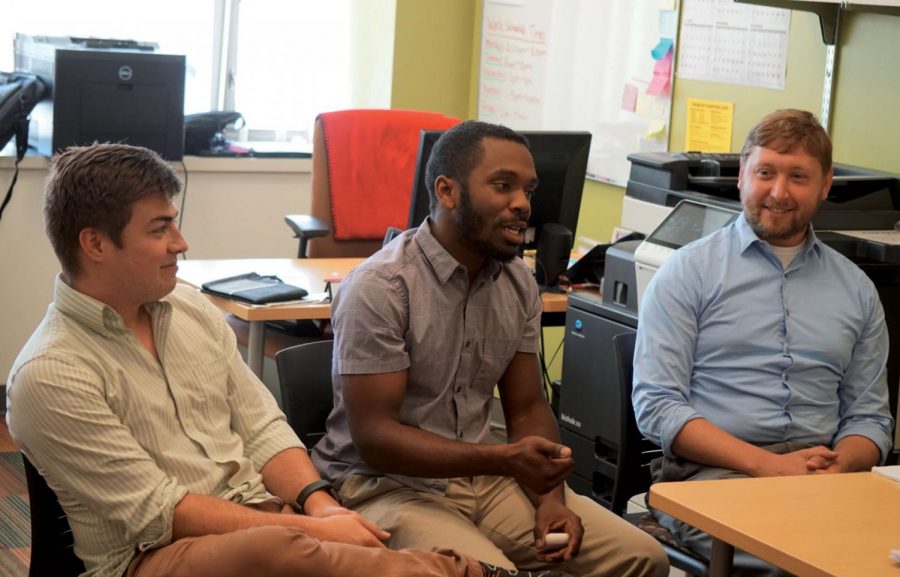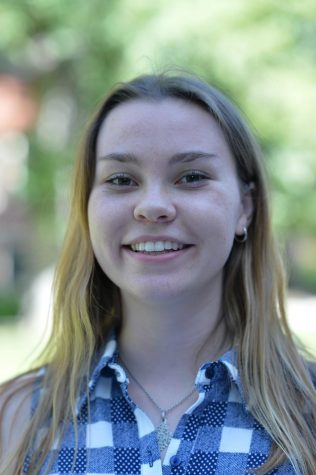GPSA leaders balance school, advocacy
Gilmore, Silva, Monroe meet with lawmakers as student advocates
ANA MARIA ALANIZ MENDOZA | THE DAILY EVERGREEN
GSPA Vice President David Silva, left, GPSA President Amir Gilmore and GPSA VP of Legislative Affairs Josh Monroe describe how they balance school with being student leaders.
August 10, 2018
Correction: Josh Munroe’s name has been updated to reflect its correct spelling.
The new leaders of GPSA — Amir Gilmore, David Silva and Josh Munroe — are performing balancing acts. They are graduate students completing their dissertations, job hunters looking for workplaces after graduation and executives of the GPSA.
“Anything you can think of, we do for graduate and professional students,” Gilmore, GPSA president, said. “We embrace the chaos that comes our way. I don’t think there’s a typical day for a student leader.”
Every year, GPSA executives cover a wide range of tasks, including advocating for graduate and professional students, managing grant funds, putting on programming and attending meetings with students, faculty and administrators.
This year, the GPSA is placing a special emphasis on mental health. The GPSA president, vice president and vice president of legislative affairs have spent the past few weeks in meetings with Cougar Health Services, determining the status of WSU’s counseling services and personnel.
Munroe, vice president of Legislative Affairs, said there is no one-size-fits-all solution for mental health on campus.
“Graduate and professional students are very diverse,” Munroe said. “Identifying what could be a stressor or not is very dependent on the individual. We need to be adaptive to the student’s needs.”
Even as they work on improving mental health on campus, reducing student debt remains a central issue for the GPSA. Gilmore says that a student’s debt can depend on their department and not every student gets fair funding.
“The variability of stipend pay in different departments is pretty high,” Gilmore said. “Some people say it’s based on social science versus the ‘hard’ sciences. But there are some graduate students who work their tails off and are really in debt.”
The executives will address student debt and research funding in part by taking trips to Washington D.C. and Olympia, where Munroe will talk to lawmakers.
“For our advocacy, we do kind of an Oreo cookie of D.C., Olympia and D.C. again,” Munroe said.
In Washington D.C., Munroe said they are expecting legislators and their staffs to be distracted by the upcoming midterms.
“We’ll be taking a pretty general approach, reminding them that we exist and what very basic graduate and professional student priorities are, like reducing student debt,” he said.
To resolve issues as overarching as debt and wellness, the team brings together knowledge from their diverse academic backgrounds.
Gilmore is a doctoral student in cultural studies and social thought in education, Vice President Silva is a doctoral candidate in communication and Munroe is working toward a doctorate in political science.
“A lot of the GPSA leadership is very much political science focused, which is surprising,” Munroe said. “My predecessor was in anthropology and did an amazing job in the role. So studying political science is helpful in some ways, but it’s not a requirement to excel.”
As students working part-time as executives of the GPSA, important issues like student debt and mental health can be overwhelming.
“We’re all students at the end of the day. We’re leaders, but we’re also students,” Gilmore said. “When our students are affected by these issues, it really hurts us. Some of these things do keep us up at night.”
Silva said some of the important issues are out of their scope.
“We can’t solve racism, or all of the economic issues in academics,” Silva said. “Realizing the limitations of time, our connections, our impact and our resources, we do what we can with what we have.”
All three executives agreed that the pains that come with facing seemingly unsolvable problems are outweighed by the joys of offering hands-on help to their fellow students.
“For someone who does research and everything is in a journal article that maybe gets published in two years, it’s really nice to have a tangible something,” Silva said. “Here’s a real person we did something for. We got them an extra $400 to cover a plane ticket. That’s something that I can never do in the academic world.”
Munroe studies policy and said his role is directly in line with his chosen career. Gilmore said his role fulfills his desire to serve.
“I’m an educator by trade,” Gilmore said. “Working with people, helping, serving, this is the mission that I enjoy doing. I don’t know what other job I would have.”










